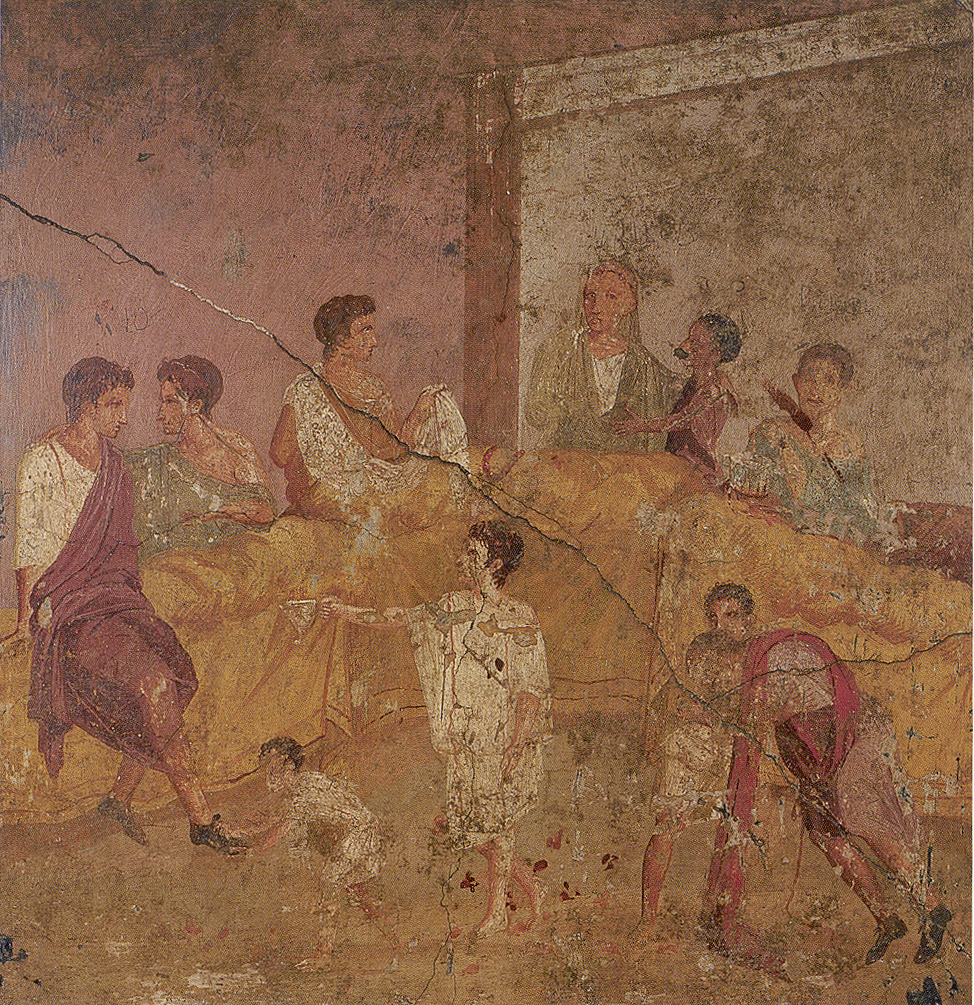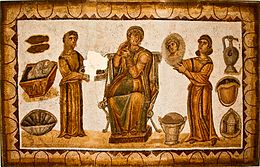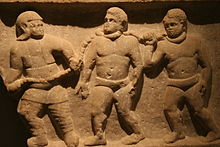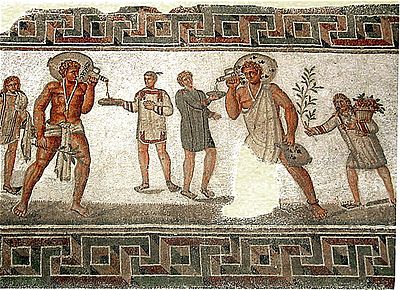Classics 351
February 24, 2022

Dinner Fresco, Pompeii, 1st Century CE
plays we've read: Casina, Pseudolus, Truculentus, Eunuchus, Self-Tormentor, Amphitryon, Menaechmi, Captivi
some examples:
direct receptions of Casina: Machiavelli's Clizia (1525), Beaumarchais's The Marriage of Figaro (1784)
indirect receptions of Casina (cross-dressing, gender-play, deception, parody of marriage): Some Like it Hot (1959), The Rocky Horror Picture Show (1975)
indirect receptions of Pseudolus (clever slave/subordinate figure, metacommentary to audience, metatheater): Horse Feathers (1932), Blazing Saddles (1974), Ferris Bueller's Day Off (1986), Fleabag (2016, 2019), mockumentaries (e.g. The Office)
Plautus’s Captivi (ca. 190 BCE)
-
source of slaves in the ancient world: POWs, kidnapped persons, exposed children, birth in slaveholding household
-
prevalent
ideology of slave ownership: slaves “naturally” inferior in character, intellect, morality, appearance ("boy");
Cato the Elder, On Agriculture 2: "Sell worn-out oxen, blemished cattle, blemished sheep, wool, hides, an old wagon, old tools, an old slave, a sickly slave, and whatever else is superfluous ...");
Varro’s description of slave as
instrumentum vocale, "a tool with a voice"
-
multi-tiered system: urban household slaves (as in comedy) vs. others (farm, mill, mines); possibility for
manumission through loyal service (wills) or purchase of freedom (cf. Hegio's remark to Guard,
120), but an institution based on
violence
(Ballio & "good slave" speeches of Harpax, Messenio; cf. nostalgia of United States South "Lost Cause")
 Toilette scene with ancillae ("maid servants") on North African Mosaic
Toilette scene with ancillae ("maid servants") on North African Mosaic
- Captivi: the arbitrariness of slavery ("We are the gods’ volleyballs!", 22); confused master/slave identity, status & social roles ("Identity Crisis"); problematizes essentializing notion of "natural slavery"
- unusual opening spectacle & prologue: two captives onstage, opening call-out to low status spectators in back (1-3) vs. citizens (15-16); Hegio's two sons (Tyndarus, Philopolemus)? Philocrates of Elis?
Captivi 39-68 (Aetolia on the Greek mainland, before house of Hegio)
So today each will impersonate the other.
Tyndarus will masterfully pull off a scheme to
Free his master, and in the very same stroke
Rescue his brother, and restore him to his
Father and fatherland as a free man—though he doesn’t even
Know he’s doing that! Often we do more good when
We have no idea what we’re doing than when we think we do!
So without knowing it, these two have
Devised and ingeniously improvised a plot,
A masterpiece of their own making, so that
This one will stay here as his father’s slave, (points to Tyndarus)
Though he has no idea his master is also his own father.
When you think about it, we mortals are wretched fools!
What follows here is fact for us actors, even if it’s fiction for all of you.
There’s one more thing I’d like to say just a few words about:
It really is in your best interests to pay attention to this play, since
It’s not the same-old-same-old you see in other comedies.
They’ll be no dirty lines not worth repeating;
Here you’ll see no greedy pimp, no nasty whore,
No bragging soldier; and don’t you worry
About that war between the Aetolians and Eleans.
All the battles will take place offstage.
It’d be downright wrong for a comic
Troupe like ours to suddenly go tragic on you!
So if anyone is bent on a battle—take it to court!
If you meet your match there, I guarantee you’ll find
Such a frightful fight that you’ll never, ever,
Want to feast your eyes on war again!
I’m out of here. Best of luck to you all, you justest of judges
In peace, and stoutest of warriors in war!

Roman Soldier Leading Captives, Marble Relief, Turkey, ca. 200 CE
-
the play's main
prop: chains (heavy ones removed by Guard at Hegio's orders,
Scene 2; "I'm pretty sure we'd all prefer to be free men / Rather than slaves",
119-20)
*PERFORMANCE of Captivi, Scene 3 (195-250): Finn (Philocrates), Jackson (Guard), Joel (Tyndarus)*
 Mosaic depicting Slaves with Wine Jars, Tunisia, 2nd Century CE
Mosaic depicting Slaves with Wine Jars, Tunisia, 2nd Century CE
- New Comedy character: Ergasilus the parasite (Scene 1): nicknamed scortum ("whore"), a slave to food & patron Philopolemus
- Philocrates plays the clever slave (deception of paterfamilias Hegio, costume/mask switch with Tyndarus?)
Captivi 274-6 (Tyndarus's aside)
Excellent! I’d take him over Thales the Wiseman, who was just an
Amateur in comparison with my master here!
Just look at how cleverly he’s playing the part of a slave.
- Tyndarus plays the "noble" master contemplating his new-found slavery; "benevolent mastery" & appeal to the ethics of reciprocity
Captivi 297-316
Tyndarus
He was just doing his duty
When he gave it to you straight—though I was trying
To keep you in the dark about my wealth and family, Hegio.
Now that I’ve lost my country and liberty
I can understand why he’d fear you more than me.
An enemy assault has made him and me equals.
I can remember when he didn’t dare say a word against me; now he has
The freedom to do as he wants. Fortune lifts and lowers us as she pleases:
I once was a free man—and she’s brought me down from the top to the bottom;
I’d grown accustomed to giving orders and now I must take them.
I can only hope to find a master just like I was,
One from whom I can expect fair and gentle treatment.
If you don’t mind, Hegio, I’d like to offer you one piece of advice.
Hegio
Go ahead.
Tyndarus
I once was just as free as your son.
His freedom and mine were both taken away by an enemy attack.
He is now a slave in my country, just as I am in your house.
Surely a god is watching and listening to what we do, and will see
That his treatment there matches your treatment of me here.
Treat me well and he’ll treat your son well—and vice-versa.
My father misses me just as much as you miss your son.
- multiple levels of irony & doublespeak, e.g Tyndarus's instructions final instructions to Philocrates ("Stress that I'm fine, Tyndarus, and don't hesitate to talk yourself up ... [my father] won't hesitate to grant you your freedom", 401ff.)
- captives' plot successful: send-off of Philoctrates to Elis (Scene 4), Hegio's joy (cf. Scene 6 song)
- reappearance of Ergasilus (Scene 5): trouble in the parasite profession?
- complication: Elean captive Aristophontes confronts Tyndarus, identity confusion with serious consequences (Scene 8)




